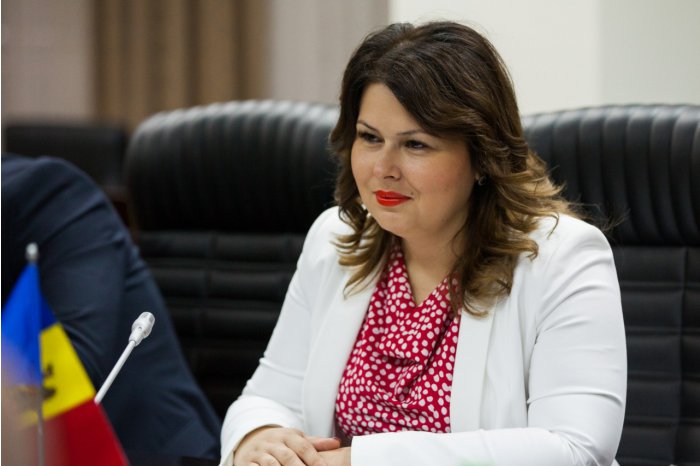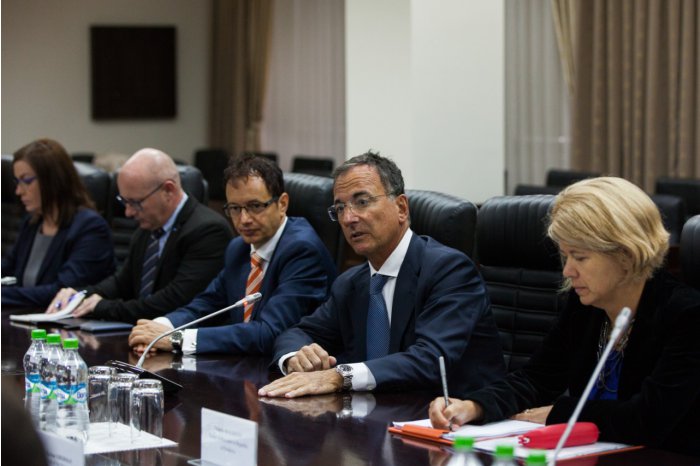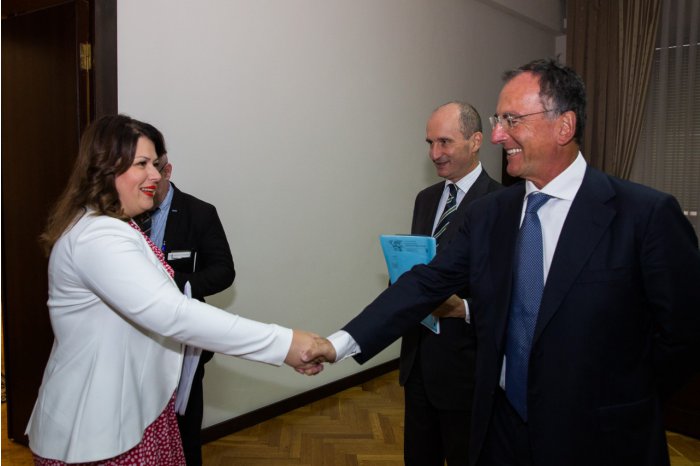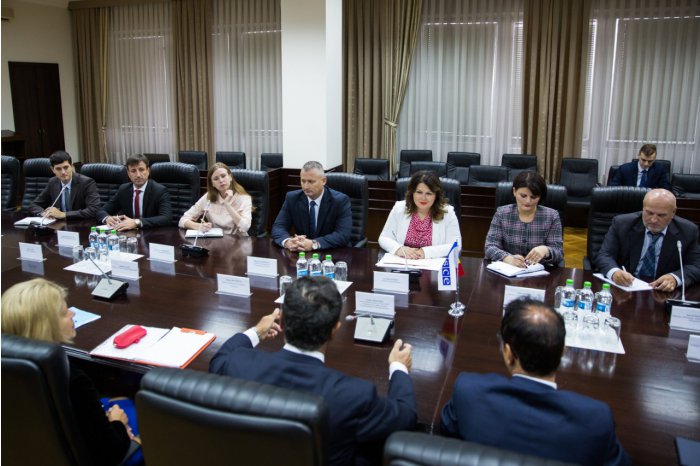Moldovan deputy premier for reintegration meets Special Representative of OSCE Chairman-in-office for Transnistrian Settlement
18:30 | 10.09.2018 Category: Official
Chisinau, 10 September /MOLDPRES/ - Deputy Prime Minister Cristina Lesnic today met Special Representative of the OSCE Chairman-in-Office for Transnistrian Settlement Franco Frattini. Attending the meeting was also new Head of the OSCE Mission to Moldova Claus Neukirch, the adviser of the special representative of the OSCE chairmanship-in-office, Alfredo Conte, and Italy’s Ambassador to Moldova Valeria Biagiotti, the Reintegration Policies Bureau has reported.
In the beginning of the meeting, Cristina Lesnic thanked the high official for the visit paid, as well as for the support provided in the process of talks on issues concerning the Transnistrian conflict settlement.
For his part, Special Representative of the OSCE Chairman-in-Office for Transnistrian Settlement Franco Frattini highlighted the significant progress registered in the Transnistrian conflict settlement process, especially in the last months.
During the dialogue, the high official noted that the next 5+2 meeting can be organized only based on the existence of the significant results in the process of negotiations.
The sides reviewed the latest developments recorded in the process of talks on the Transnistrian conflict settlement and namely the degree of implementation of the subjects on the agenda of the so-called Berlin plus package. In the context, Deputy Prime Minister Cristina Lesnic touched upon the following things:
As for the subject of apostilling the education documents in the Transnistrian region, the official specified that the mechanism agreed was fully functional; at present, 116 education diplomas of the Tiraspol-based Taras Shevchenko University are apostilled.
As for the topic on the settlement of difficulties faced by the Latin-script Moldovan schools, Lesnic said that visible progress had been registered in the implementation of the protocol decision signed to this end, such as the cut in the price for rent; nevertheless, it is necessary to solve aspects dealing with the free movement of pupils and teachers.
As far as the issue of access of farmers from the Dubasari district to the lands beyond the Tiraspol-Camenca highway is concerned, the official said that, in line with the provisions of the protocol decision, On measures of regulating the issues dealing with the carrying out of the 2006 mechanism on the use of farmlands placed in the Dubasari district, beyond the Tiraspol-Camenca highway, from 25 November 2017 and in line with the provisions of item 6 of the protocol of the meeting of the 5+2 format of negotiations, held in Rome on 29-30 May 2018, the 2006 mechanism was re-established starting from 1 August 2018.
We note that, due to efforts made by the Moldovan side in the process of talks, decision-makers managed to extend the term of access from 1 year to 20 years, in order to ensure durability of the process and sustainability of the investments.
As for the process of organizing the interaction in the telecommunications sector, Lesnic said that meetings were constantly held in the concerned field, the participants in which discussed comprehensive solutions to settle the present dissensions.
We remind that, according to the stipulations of the protocol of the official meeting of the permanent conference on political issues in the Transnistrian settlement process, held in Rome on 29-30 May 2018, the roadmap on the implementation of the provisions of the protocol decision On the organization of interaction in the telecommunications sector, from 25 November 2017, was signed by the coordinators of the working groups on 28 June this year.
The official also focused on the subject on identifying a mechanism of ensuring the access of vehicles from the Transnistrian region to the international road traffic through its launch in the testing regime starting from 1 September 2018, in line with the protocol provisions signed on 24 April 2018.
We specify that the points for the registration of transport means from the Transnistrian region were opened in the Tiraspol and Rabnita cities and beneficiaries of this mechanism are private persons, as well as legal entities who do not carry out commercial activity and are registered at the Public Services Agency, including by plurality of offices, with other compulsory conditions for both categories.
At the same time, the deputy prime minister noted that, as for the human rights dimension, two meetings of the working groups on human rights had been already held and the sides established the working agenda which contains the following: protection of persons with disabilities; protection of the rights of children at risk; repatriation of children victims of trafficking; prevention of violence in the Internet environment; prevention and combating of domestic violence; protection of persons living with HIV/AIDS against actions of discrimination/segregation and their re-socialization.
Also, the participants in the meeting tackled the situation in the Security Zone, as well as the recent events which took place in this area.
Attending the meeting, new Head of the OSCE Mission in Moldova Claus Neukirch said that he would undertake needed measures for the continuation of the present positive dialogue.
In the end of the meeting, Deputy PM Cristina Lesnic thanked the official for the visit paid, noting that Chisinau was further relying on the support provided, in the context of the Transnistrian problems’ settlement.
According to agreements reached, immediately after the meeting, the officials paid a visit to Tiraspol, during which Franco Frattini on the spot took knowledge of the windows for the registration of transport means.




